
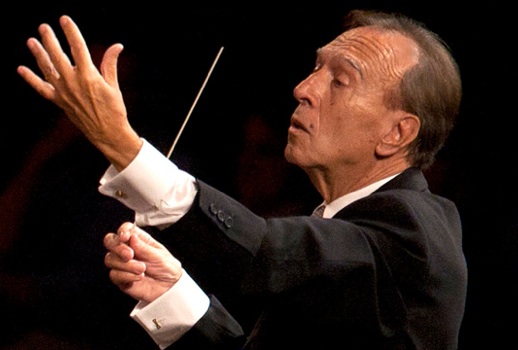
In our conversations about these performances, I extolled Abbado’s impeccable talent for summoning depth and emotion from within the music’s internal structure, and his drawing of what Alban Berg deemed an expression of “extraordinary love of the earth” from scores often perceived as statements on the composer’s mortality.
How ironic then that hours later, I would discover that this artist who for me embodied so much of what was life affirming and rapturous in music had just departed the mortal plane.
Abbado’s conducting career began in the late 1950s, his mastery of genres covering a sizeable footprint of the operatic and orchestral canon, its chronology spanning composers from Bach and Pergolesi to György Kurtág and Wolfgang Rihm.
With the sheer scope of his musical purview, I find it impossible to imagine a modern performance culture that wasn’t shaped by the great conductor’s gifts and artistic vision.
Much of Abbado’s artistic output consistently represented paragons for crafting musical expression through his use of rhythmic precision, finely graded instrumental colors and dynamics, and balanced architectural construction.
One can hear evidence of these qualities most powerfully in his interpretations of operas by Rossini and Verdi, his multiple surveys of Mahler’s symphonies, his complete Ravel from London, his emotionally rich traversal of compositions by Berg and Webern, his championing of contemporaries like Nono and Stockhausen, and his concerto collaborations with Martha Argerich and Maurizio Pollini (my favorites of which are the Bartok, Prokofiev, and Ravel).
Though reticent and cool-tempered, Claudio Abbado often absorbed himself into a score and became a master of transforming the space between silence into an impassioned and cathartic experience. One can often develop a sense for how a conductor evolves a phrase with the physicality of their gesture.
With Abbado, I often am astonished by his sacerdotal presence on the podium, as if he were the pontiff presiding over the sacred ritual of creating art with his musicians. His interactions with his orchestra were often marked by a searching look in his eyes while his hands lovingly sculpted the music in a gentle, free form manner.
Occasionally he would bring his right hand close to his lips, encouraging his players to listen. For gestures of such economy, it all made a difference: his music making could be absolutely electrifying.
Today, listeners can reap the dividends of Abbado’s artistry through the massive discography he produced over a lifetime leading musical institutions like the Teatro alla Scala, the Wiener Staatsoper, the London Symphony Orchestra, the Chicago Symphony Orchestra, the Vienna Philharmonic, and the Berlin Philharmonic.
After a frightening episode where he battled and survived stomach cancer, he jumpstarted the autumnal phase of his career by founding the present incarnation of the Lucerne Festival Orchestra—a star ensemble spearheaded in various sections by soloists like Natalia Gutman, Albrecht Mayer, Sabine Meyer, Emmanuel Pahud, Stefan Dohr and members of the Alban Berg, Hagen, and Leipzig Gewandhaus quartets.
In those later performances, likely inspired by his harrowing near-death experience, his music making would gain a more probing spiritual quality and an overwhelming intensity. Combing through such a massive discography of riches may seem daunting, but for this parterre tribute, I’d like to spend some time discussing a few of my favorite recorded Abbado performances of operas and vocal music.
My journey with Claudio Abbado began with the operas of Rossini and Verdi, whose works he championed and transformed into outstanding recordings while he was music director at La Scala. The ones I return to the most are Rossini’s Il Viaggio a Reims and Verdi’s Macbeth, Simon Boccanegra, and Don Carlo (the live one from 1977 captures a searing performance at La Scala, and can be accessed in one of Christopher Corwin’s Trove Thursday specials .)
When narrowing this shortlist further, I’d have to say that Abbado’s Simon Boccanegra stands out as the most revelatory for how exquisitely he and his La Scala musicians shape the dramatic pulse, colors, and flowing lines of this gorgeously tinted and tonally innovative score.
Videos of the iconic Giorgio Strehler production, cast with incredible singers like Piero Cappuccilli and Mirella Freni, can be viewed on YouTube.
Outside these cornerstones of the Italian canon, Abbado also proved a remarkable ambassador for the operas of Mussorgsky, Debussy, and Alban Berg. While one can quibble about the lack of a brooding “Russian” quality in his presentations of Mussorgsky’s Boris Godunov and Khovanshchina, both recordings give the most unified, soulful, and sumptuous readings of these difficult and rarely produced operas.
Certainly, for delving into the intricacies of Mussorgsky’s scores, there are no better recordings to follow for discovery or study.
His Pelléas et Mélisande, characterized by a febrile, dramatically impelled orchestral accompaniment and fine singing, is one of the great studio era recordings of the work. While his Wozzeck can sometimes be slightly analytical where raw dramatic thrust seems appropriate, his ability to simultaneously embody the expressionistic and late Romantic character of Berg’s orchestral language is paralleled by few others.
In a departure from his home turf, a video that features him conducting Harry Kupfer’s stygian production of Strauss’ Elektra reveals an orchestral image that balances the graceful, waltz-like Apollonian aspects of the score with its Dionysian brutality. What I would give to buy out the contract for Philips Classics’ fabled studio recording that remains unreleased in the company’s vaults!
Although he only occasionally dipped his baton into the world of Richard Wagner, Abbado proved to be an exceptional Wagnerian in the few instances he delved into the Arthurian music dramas. His studio recording of Lohengrin deserves accolades for the Italianate shimmer and the dramatic impulse he imparts to the score (and for Cheryl Studer and Waltraud Meier’s incredible assumptions of Elsa and Ortrud).
His Salzburg performances of the composer’s Tristan und Isolde and Parsifal, hailing from the final years of his tenure with the Berlin Philharmonic, are lesser known as they haven’t been released on an official label. Both deserve a listen for Abbado’s enthralling and languorous orchestral accompaniment and for the entire team’s engrossing presentation of Wagner’s dramas.
The Tristan casting is sensational, featuring Ben Heppner and Deborah Polaski in top form in 1998; the Parsifal is less starry, but Urmana’s Kundry is exceptional under Abbado and the rest of the cast acquit themselves well).
I’ve provided here an audio file of the second act of Parsifal from the Salzburg Festival of 2002. Although Peter Stein’s production was critically panned, the musicianship of the singers and the orchestra’s performance were praised to the skies.
Here, Abbado’s reading suspends Parsifal’s endless transitional orchestral lines in air, the filigrees of Wagner’s score emerging in and out of a diaphanous blanket of sound. Eschewing the weightiness traditionally associated with the work, he approximates the logical transparency of Boulez’s interpretation while still retaining a dramatic intensity that eluded the French conductor.
No survey of Abbado’s work is complete without a discussion of his tremendous interpretations of the symphonies of Gustav Mahler, the composer for whom I believe he had the greatest affinity.
If Abbado could be slightly tepid in the core works of the Austro-German symphonic canon, Mahler’s turbulent world untamed his normally cerebral sensibilities, enabling him to recreate the composer’s symphonies with soaring and lyrical melodic lines, sensitive instrumental balances, and well-calibrated climactic eruptions that devastate the listener without indulging in schmaltz.
Abbado immortalized many terrific interpretations of Mahler over three periods during his career’s post-operatic phase. For me, the Chicago/Vienna period (1980s) is best characterized as untrammeled and volcanic, the Berlin period (mid 90s to early 2000) fluid, full of Innigkeit, and virtuosic, and the Lucerne period (2002-2014) spiritual and searching.
A sole recorded Das Lied von der Erde survives from those latter years, performed during the centenary of Mahler’s death (May 18, 2011) with his old Berlin Philharmonic.
Among Abbado’s performances of Mahler, nothing quite touches me like this fascinating Das Lied von der Erde, its poems sung with sensitivity and depth by Jonas Kaufmann and Anne Sofie von Otter. Kaufmann’s ringing tenor is an asset in the odd songs, his powerful outbursts making the Trinklied a savage protestation against death, his lyrical caressing of his later music providing a sweet and cooling contrast.
The gems of this performance, however, are the even songs. Here, Von Otter and Abbado sublimate themselves into the fabric of Mahler’s music, the melancholy Der Einsame im Herbst emerging with a purity and directness enhanced by Von Otter’s word painting, the Von der Schönheit sparkling and ebullient.
The Abschied is doubly devastating and life affirming, with the text and music carefully shaded and nuanced by conductor and singer to unfurl the poem in the most natural manner. From the orchestral side, Abbado captures Mahler’s multiple imageries of nature, the shadows and light conveyed beautifully by the virtuosic Berlin Philharmonic.
If there is a better performance of Mahler’s great symphony for the voice, I have yet to hear something that surpasses this.
Even today, it is difficult for me to fathom the lacunae created in the wake of Abbado’s passing. He was a prolific seeder of orchestras, having created the Filarmonica della Scala, the Gustav Mahler Jugendorchester, the Mahler Chamber Orchestra, the Lucerne Festival Orchestra, and the Orchestra Mozart.
An advocate of new music and smaller forms, he created the festivals Wien Modern and Berlin Encounters as a channel for composers to premiere their works and for his orchestral musicians to fine tune their ears in the intimate world of chamber music.
Lastly, Abbado was a cerebral and impassioned champion of contemporary music, having premiered orchestral and operatic scores for post-Second Viennese composers like Karlheinz Stockhausen, Wolfgang Rihm, György Kurtág, Giacomo Manzoni, Luigi Dallapiccola, and Luigi Nono.
Some of these composers, including Nono (most notably, a La Scala premiere for his opera Al gran sole carico d’amore) and Rihm, even dedicated pieces to him.
No other musical director of a major institution today can boast of such breadth and flexibility of idiom. Perhaps Simon Rattle and Salonen come close, as exemplified in their partnerships with great Scandinavian composers like Magnus Lindberg and Kaija Saariaho. Certainly, no one of this stature today can claim having created so many ensembles and premiered new large scale works for both the orchestra and the theater.
Abbado was 80 when he passed away—certainly not young by any standard, but in a profession where the only physical limitations to art are the soundness of mind and body, it’s only natural for his admirers and lovers of music to ask for more.
Near the end of his life, he contemplated performing the entirety of Alban Berg’s 3-Act Lulu, a production that would have been presided by the Austrian director Michael Haneke and starring either Marlis Petersen or Anna Prohaska as the eponymous antiheroine.
What an event that would have been—a fitting close to complete his traversal of Berg’s oeuvre, and a compelling new interpretation of a great opera by one of the composer’s greatest champions.
Whenever I think of Claudio nowadays, one of the performances that usually comes to mind is his spiritually wrenching Mahler 9th from the 2010 Lucerne Festival. The evolution of Abbado’s artistic philosophy on the composer’s otherworldly penultimate symphony has always fascinated me, but there was something unique about this one.
The bookend movements were more drawn out, the wind and brass solos gaining a poignancy in the inner movements that I’d never heard in Berlin or Vienna.
Capping this sublime experience was an intensely inward looking Adagio—suffused with the most intimately spiritual final pages I’ve heard of this great score to date.
As Mahler tapers his elegiac orchestration to an intimate grouping of strings, the lights of the hall are gradually dimmed, and one can see Abbado basked in a numinous glow, his eyes shut as if in a prayer, gently caressing his strings in that final, protracted quotation from the Kindertotenlieder.
Claudio here coaxes his strings to stretch Mahler’s final D-flat Major triad as if challenging the boundaries of infinity, diminishing this great symphony into ether, and finally, silence.














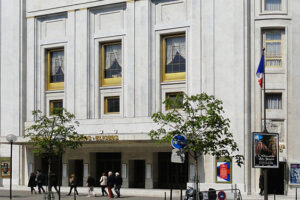
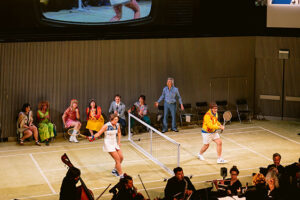
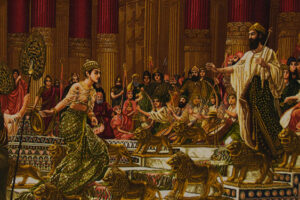
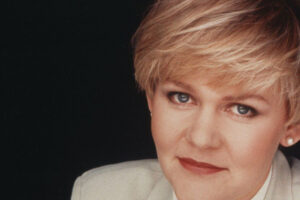






Comments